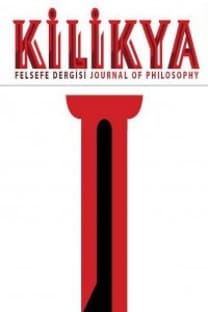Agonistik Demokrasideki Kayıp Kavram: Bir ‘Modus’ Olarak Egemen
Çatışmacı demokrasi kuramıyla Ernesto Laclau ile birlikte yarım asırdır siyaset felsefesi yazınına katkıda bulunan Chantal Mouffe yakınlarda kuramın aldığı son şekli, önceki çalışmaları da özetleyecek bir biçimde bir makalede ele aldı. Bu çalışma, anılan makalede geliştirilmiş izleğe bağlı kalarak şu üç görüşü temellendirmek amacındadır: 1) Mouffe'un, mevcut liberal demokratik siyaset pratiklerinin dayandığı ontolojik kabullerin "çatışma" nosyonunu kavrayamamak nedeniyle siyasetin güncel krizlerine yanıt veremeyeceğine ilişkin saptamaları doğrudur. 2) Buna karşın, liberal demokrasilerin güncel açmazıyla başa çıkabilmek üzere Mouffe'un önerdiği "agonistik çare" ontolojik bir yaptırım kuramına dayanmayı başaramadığı için zorunlu olarak "etik tavsiye" düzeyinden öteye gidememektedir. 3) Mouffe'un önerdiği çarenin ifade olanağı bulacağı bir kuram için Spinozacı bir "güç ontolojisi" ve aynı çerçevede bir 'modus' olarak "egemen" kavrayışının geliştirilmesi zorunludur.
The Missing Concept in Agonistic Democracy: The Sovereign as a ‘modus’
Chantal Mouffe, who has been contributing to the trajectory of political philosophy for almost fifty years mostly in collaboration with Ernesto Laclau, recently published an article to signal what her political theory finally looks like based on her previous research presented rather in a nutshell fashion. This paper aims at developing an argument for the justification of three remarks based on the program developed in Mouffe's aforementioned latest work: 1) Mouffe is right in her claim that the existing liberal democratic practices of politics are far from responding to current crisis of politics, as they fail to develop relevant ontological convictions to understand the very notion of 'conflict'. 2) Nevertheless, the agonistic relief suggested by Mouffe herself to tackle with the contemporary challenges, which cannot be taken by liberal democracies as such, also falls short and cannot go beyond making moral recommendations for it also lacks an underlying ontological force. 3) Development of a Spinozistic power ontology -together with the conception of 'the ruler' as a 'modus'- is a necessary condition if we are to benefit from Mouffe's agonistic relief.
___
- Mouffe, C. (2016). Democratic Politics and Conflict: An Agonistic Approach. Politica Comun (9). doi: http://dx.doi.org/10.3998/pc.12322227.0009.011
- Mouffe, C. (1993). The Return of the Political. London: Verso.
- Mouffe, C. (2000). The Democratic Paradox. London: Verso.
- Mouffe, C. (2005). On the Political: Thinking in Action. London: Routledge.
- Spinoza, B. (1910). Ethics (A. Boyle, Ed., G. H. R. Parkinson, Rev.). London: Everyman's Library.
- Spinoza, B. (2004). Etika (H. Z. Ülken, Çev.). Ankara: Dost Yayınları.
- Spinoza, B. (2004). A Theological Political Treatise and A Political Treatise. New York: Dover.
- Spinoza, B. (2010). Tractatus Theologico-Politicus (Teolojik-Politik İnceleme) (Cemal Bali Akal & Reyda Ergün, Çev.). Ankara: Dost Yayınları.
- van Rompaey, C. (2015). Language and Meaning in the Ethics. or, Why Bother with Spinoza's Latin? Parrhesia (24), 336-366.
- Williams, C. A. (2017). Unravelling the Subject with Spinoza: Towards a Morphological Analysis of the Scene of Subjectivity. Contemporary Political Theory (16) 3, 342–362.
- Negri, A. (2008). Subversive Spinoza. Manchester: Manchester University Press.
- Runciman, D. (2016). Politika. İstanbul: Domingo Yayınları.
- Yağanak, E. (2016). Otoritenin Şiddet Kullanma Hakkından Söz Edilebilir mi? Beytulhikme: An International Journal of Philosophy (6) 2, 143-168.
- Yayın Aralığı: Yılda 2 Sayı
- Başlangıç: 2014
- Yayıncı: Eray Yağanak
Sayıdaki Diğer Makaleler
Karşıolgusal Önermeler ve Bağlam: Brogaard ve Salerno'ya Bir Cevap
Nietzsche’de Arı Öznenin Eleştirisi
Alasdair MacIntyre’ın Çağdaş Sorunlar Karşısında Yeni Aristotelesçiliği
Agonistik Demokrasideki Kayıp Kavram: Bir ‘Modus’ Olarak Egemen
Dil Felsefesindeki Klasik Anlayışa Karşı Saussure’ün Örtük İtirazları
Bilgiyi Nasıl Temsil Edebiliriz? Bir Örnek Olarak Sorular ve Sorgulayıcı Mantık
